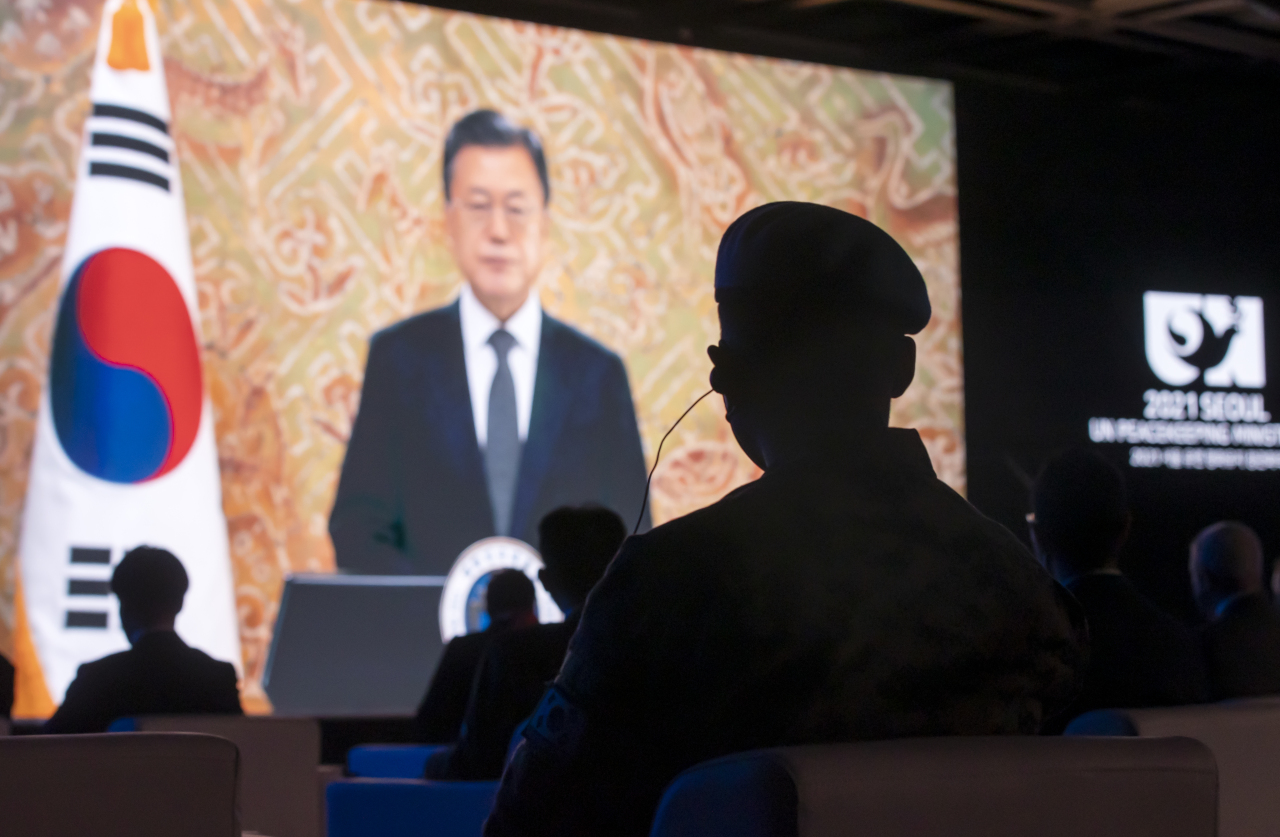With the clock ticking on his term in office, President Moon Jae-in is taking every opportunity to push his agenda to declare the end of the Korean War. But experts are raising questions about his motivations and about the validity of his goal.
“The declaration of an end to the war is the first step toward peace and denuclearization on the Korean Peninsula,” Moon said in a congratulatory video speech at the 2021 Seoul UN Peacekeeping Ministerial in Seoul on Tuesday night.
He urged the international community to work together to create a new order of reconciliation and cooperation by formally ending the war, and to work for peace on the Korean Peninsula and throughout the world.
His remarks are in line with Seoul’s recently ratcheted up efforts to persuade concerned countries to support an official declaration ending the Korean War.
Last week, South Korean national security adviser Suh Hoon flew to China to meet with top Chinese diplomat Yang Jiechi. Suh explained the government’s efforts to advance the peace process on the Korean Peninsula, including the envisioned declaration.
Moon also met with US Defense Minister Lloyd Austin in Seoul on Dec. 2 to explain his motives for wanting to end the war. Korea National Diplomatic Academy Chancellor Hong Hyun-ik said early this month in a press briefing in Washington that there will be a crisis next year unless the war is formally ended.
Despite Moon’s last-ditch efforts, experts are skeptical, and some say his apparent obsession is driven by a desire to save face despite his fruitless North Korea policies, said political commentator Rhee Jong-hoon.
For much of his term, Moon focused on policies toward the North. They paid off at first, resulting in three inter-Korean summits and two US-North Korea summits.
However, the relationship soured again. North Korea blew up a joint liaison office with the South near the North’s border town of Kaesong. The agreements made during the summits have never been followed.
“If the two Koreas restart the dialogue and declare the war’s end, this is a historical event. Involved parties should gather to sign it -- whether in Panmunjeom or Seoul. This will be a huge event,” Rhee said, adding that it could mean a ruling party victory in the upcoming election.
“Moon seems to be judging that this is a card that can help re-create the regime in the run-up to the election in about three months.”
Lee Jae-myung, the ruling Democratic Party of Korea’s presidential candidate, agrees with Moon and has said political considerations must not prevent an end-of-war declaration.
Hong Min, a senior researcher at the Korea Institute for National Unification’s North Korean research division, said Moon’s push to end the war is not being advanced just for political reasons.
Through the Panmunjom Declaration in 2018, the two Koreas agreed to cooperate to officially end the Korean War. The same year, then-US President Donald Trump and North Korean leader Kim Jong-un agreed to speed up the denuclearization process by signing a joint statement.
“Moon Jae-in believes that the reason the 2018 agreements are not being followed and the current deadlock came is that the two Koreas did not declare an end to the war,” Hong said.
“Moon thinks the declaration is a starting point for the peace process on the peninsula,” Hong said.
Moon’s logic would have been right in 2018, Hong said, when the complete denuclearization of the North and corresponding measures from the US were on the table.
Things have changed now. North Korea took denuclearization off the table and announced it was upgrading its weapons. The US firmly maintains that it will not accept the North’s demands or alleviate sanctions without denuclearization.
“In the changed situation, it is questionable whether it is right for the government to say that the end-of-war declaration is still the starting point,” Hong said.
On Tuesday, 35 lawmakers from the US Republican Party sent a letter to the White House expressing that they were against the push for an end-of-war declaration.
In a letter to National Security Advisor Jake Sullivan, they said, “We are gravely concerned that this declaration, instead of promoting peace, would seriously undermine and destabilize the security of the Korean peninsula.”
“We also support the measured approach you have demonstrated thus far and urge you to engage with your South Korean counterparts on the clear dangers and risks of this strategy.”
In response, Korea’s Foreign Ministry said, “The declaration of the end of the war is not a legally binding peace agreement,” adding that it will not pose a severe risk to the stability of the US military in Korea and the region as the lawmakers feared.
The ministry added there are various opinions surrounding the end-of-war declaration in the US, with voices of concern and voices of understanding and supporting it.
By Shin Ji-hye (
shinjh@heraldcorp.com)








